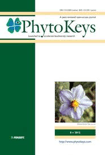
PhytoKeys
Scope & Guideline
Empowering research in ecology and evolution.
Introduction
Aims and Scopes
- Taxonomic Research:
The journal places a strong emphasis on taxonomic studies, including the description of new species, revisions of existing taxa, and the establishment of new genera based on morphological and molecular data. - Biodiversity Documentation:
PhytoKeys aims to document plant biodiversity with a particular focus on underexplored regions, highlighting the discovery of new species and their ecological significance. - Molecular Phylogenetics:
The journal frequently publishes studies that utilize molecular techniques to resolve phylogenetic relationships, clarify taxonomic boundaries, and provide insights into evolutionary history. - Ecological and Biogeographical Insights:
Papers often explore the ecological roles and biogeographical distributions of newly described species, contributing to a broader understanding of plant ecology and conservation. - Conservation and Systematics:
The journal also addresses conservation issues related to plant taxonomy, emphasizing the importance of accurate classification in biodiversity conservation efforts.
Trending and Emerging
- Integrative Taxonomy:
There is a growing emphasis on integrative taxonomy, combining morphological, molecular, and ecological data to provide a more holistic understanding of plant species and their relationships. - Focus on Endemic and Rare Species:
Research on endemic and rare species, particularly those from biodiversity hotspots, has gained momentum, highlighting the importance of conservation and the need for detailed studies in these areas. - Climate Change Impact Studies:
An increasing number of studies are addressing the impacts of climate change on plant species distributions, particularly in vulnerable ecosystems, which is critical for future conservation strategies. - Diatom and Microalgae Research:
There is a rising interest in the taxonomy and ecology of diatoms and microalgae, reflecting a broader trend in environmental monitoring and assessment of freshwater and marine ecosystems. - Use of Genomic Techniques:
The application of genomic techniques for species identification and phylogenetic studies is becoming more prevalent, enhancing the resolution of taxonomic relationships and species delimitation.
Declining or Waning
- Traditional Morphological Studies:
There is a noticeable decrease in purely morphological studies without molecular backing. The trend is towards integrative approaches that combine morphological and molecular data. - General Flora Surveys:
The journal has shifted away from broad flora surveys in favor of more focused studies on specific taxa or biogeographic regions, indicating a move towards targeted research. - Nomenclatural Studies:
While nomenclatural clarifications remain important, the frequency of papers solely dedicated to nomenclature has declined, as these discussions are often integrated into broader taxonomic revisions.
Similar Journals

BRITTONIA
Fostering Knowledge in Botany and Environmental InteractionsBRITTONIA, published by Springer, stands as a reputable journal dedicated to advancing the fields of botany and plant sciences. With a storied history dating back to 1931, this journal has evolved to embrace contemporary research spanning various aspects of plant biology, ecology, and systematics. Focusing on a comprehensive analysis of both ecological interactions and plant systematics, BRITTONIA plays a crucial role in disseminating knowledge among researchers and professionals committed to understanding plant life and its environmental contexts. Despite its open access status being currently unavailable, the journal ensures wide accessibility through institutional subscriptions. In the latest rankings, it proudly holds a Q2 category in Plant Science and a Q3 category in Ecology, Evolution, Behavior, and Systematics, indicating its growing influence and academic rigor. Researchers and students alike will find BRITTONIA an essential resource for the latest findings and discussions in plant sciences.

KOREAN JOURNAL OF PLANT TAXONOMY
Advancing plant knowledge, one species at a time.Korean Journal of Plant Taxonomy, published by the Korean Society of Plant Taxonomists, serves as a pivotal platform for researchers and professionals in the fields of plant taxonomy and ecology. With an ISSN of 1225-8318 and a burgeoning E-ISSN of 2466-1546, this journal aims to disseminate high-quality research that contributes to our understanding of plant species diversity, classification, and evolution. Spanning the years from 2018 to 2024, the journal finds its niche within Q3 rankings in both Ecology, Evolution, Behavior and Systematics and Plant Science, reflecting its impactful contributions and relevance in the academic community. The journal's scope encompasses various studies aimed at advancing plant taxonomy in South Korea and globally. By fostering collaboration and sharing groundbreaking research, the Korean Journal of Plant Taxonomy plays a crucial role in shaping the discourse in plant sciences, making it an invaluable resource for students, researchers, and professionals alike, committed to advancing knowledge in this dynamic field.
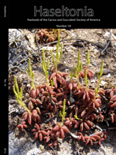
HASELTONIA
Advancing Knowledge in Plant ScienceHASELTONIA is a distinguished journal published by the CACTUS SUCCULENT SOC AMER INC, focusing on the field of plant science with particular emphasis on cacti and succulent plants. With an ISSN of 1070-0048 and an E-ISSN of 1938-2898, this journal has carved a niche for itself in the academic community, boasting a 2023 Scopus rank of #204 out of 516 in Agricultural and Biological Sciences, placing it in the 60th percentile. HASELTONIA spans several converged years from 2002 through 2024, reflecting its commitment to publishing pertinent and timely research. This journal is recognized for its significant contribution to the understanding and conservation of succulent flora and is classified in the Q2 category in Plant Science, indicating a solid impact in the field. HASELTONIA aims to promote research collaboration, disseminate innovative findings, and foster knowledge sharing among researchers, professionals, and students alike, making it an essential resource for anyone dedicated to the study and appreciation of plant diversity.
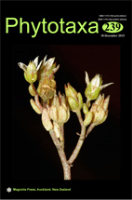
Phytotaxa, published by MAGNOLIA PRESS, is an esteemed journal in the fields of Plant Science and Ecology, Evolution, Behavior and Systematics. Established to cater to the growing need for high-quality research dissemination in botany, this journal presents the latest findings in plant taxonomy, systematics, and biodiversity. With its H-Index reflecting significant academic influence, and recognized as Q2 in Plant Science and Q3 in Ecology by Scopus, it stands as a reputable source for scholars and practitioners alike. The journal operates without open access restrictions, allowing for a wider reach to its audience. Positioned in New Zealand, Phytotaxa has been pivotal since its inception, contributing to the global understanding of plant diversity and ecology from 2010 to 2024. Its rigorous peer-review process ensures the high quality of published articles, making it an essential resource for researchers, professionals, and students dedicated to advancing the field of botany.

TAIWANIA
Unveiling the complexities of our natural world.TAIWANIA is a prestigious and long-standing journal dedicated to the fields of ecology, evolution, and systematics, published by NATIONAL TAIWAN UNIVERSITY PRESS. Since its inception in 1947, this open-access journal has provided a vital platform for researchers to disseminate their findings, encouraging collaboration and innovation in the ecological sciences. With a 2023 impact factor placing it in Quartile 2 for Ecology and Quartile 3 for Ecology, Evolution, Behavior and Systematics, TAIWANIA is recognized for its quality and influence, ranking #267 out of 461 in Environmental Science and #426 out of 721 in Agricultural and Biological Sciences within Scopus. The journal currently publishes contributions from both local and international researchers, showcasing a diverse array of topics that address crucial ecological issues and facilitate the advancement of knowledge in the discipline. For those seeking rigorous research, engaging reviews, and a commitment to open access, TAIWANIA remains a significant resource for the global scientific community.

PLANT SYSTEMATICS AND EVOLUTION
Connecting Taxonomy and Ecology for a Greener TomorrowPlant Systematics and Evolution is a prestigious journal published by Springer Wien, dedicated to advancing research within the fields of plant taxonomy, evolution, and ecology. With its ISSN 0378-2697 and E-ISSN 1615-6110, this journal has been pivotal in shaping the scientific landscape since its inception in 1974. Based in Austria, it occupies a significant position in the academic community, being ranked in the Q2 quartile in both Ecology, Evolution, Behavior and Systematics and Plant Science as of 2023. This high-impact journal is recognized for its rigorous peer-review process and is indexed among the top publications in its category, holding a Scopus rank of #176 out of 516 in Plant Science and #252 out of 721 in Ecology, highlighting its relevance and quality in the research community. Although it does not currently offer open access, the journal is committed to making significant contributions to the understanding of plant biodiversity and evolutionary processes. This makes it an essential resource for researchers, professionals, and students aiming to know the latest developments in the study of plant systematics and evolution.
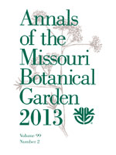
ANNALS OF THE MISSOURI BOTANICAL GARDEN
Championing Research for a Greener TomorrowANNALS OF THE MISSOURI BOTANICAL GARDEN is a prestigious, peer-reviewed journal published by the Missouri Botanical Garden, focusing on the rich disciplines of Ecology, Evolution, Behavior, and Plant Science. With a storied history dating back to 1946, this journal has evolved to become a significant platform for scholars and professionals to disseminate research that informs global understanding of plant biology and conservation. Ranked in the Q2 category for both Ecology and Plant Science in 2023, it boasts commendable standings within the Scopus rankings, placing it in the 66th percentile for Plant Science and the 65th percentile for Ecology, Evolution, Behavior, and Systematics. The journal's commitment to rigorous scientific standards ensures that it remains a vital resource for those seeking to explore vital ecological and botanical research. As a product of the esteemed Missouri Botanical Garden, the journal serves researchers, professionals, and students alike, encouraging collaboration and innovation in the plant sciences community.
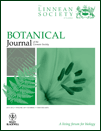
BOTANICAL JOURNAL OF THE LINNEAN SOCIETY
Bridging Disciplines in Ecology and Plant ResearchThe Botanical Journal of the Linnean Society, published by Oxford University Press, stands as a premier platform for interdisciplinary research within the realms of Ecology, Evolution, Behavior, and Plant Science. With a notable impact factor reflective of its esteemed reputation, this journal is classified in the Q1 quartile for both Ecology and Plant Science, placing it among the most influential publications in these fields. Since its inception in 1969, and with an anticipated convergence of research extending to 2024, it has become essential for scholars and professionals seeking to engage with cutting-edge studies, theoretical frameworks, and practical applications that drive our understanding of plant biology and ecological systems. The journal’s commitment to excellence is underscored by its robust Scopus rankings—achieving an impressive 83rd percentile in Ecology and a 82nd percentile in Plant Science. This makes the Botanical Journal of the Linnean Society a crucial resource for researchers, educators, and students alike, eager to advance their knowledge and contribute to the evolving discourse in botany and environmental studies.

KEW BULLETIN
Exploring the Intricacies of Flora and EcosystemsKEW BULLETIN is an esteemed academic journal dedicated to the fields of plant science and ecology, published by SPRINGER LONDON LTD. With an ISSN of 0075-5974 and E-ISSN 1874-933X, it has been a significant resource for researchers and scholars since its inception in 1993, currently covering converged years up to 2024. The journal holds a notable position with a 2023 category quartile ranking of Q3 in Ecology, Evolution, Behavior and Systematics and Q2 in Plant Science, highlighting its contributions to advancing knowledge in these critical areas. Its Scopus ranks—#333 in Plant Science and #475 in Ecology, showcasing a percentile rank of 35th and 34th respectively—further authenticate its standing among peers. While KEW BULLETIN is not an open-access publication, it offers valuable research findings, insightful reviews, and fosters academic discourse, making it an essential platform for professionals, students, and researchers passionate about understanding the intricacies of plant life and ecological systems. Located at 236 Grays Inn Rd, 6th Floor, London WC1X 8HL, England, the journal remains committed to disseminating high-quality research and supporting the scientific community.
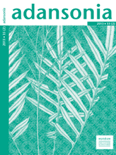
ADANSONIA
Unveiling the complexities of plant life worldwide.ADANSONIA is a distinguished, peer-reviewed open access journal dedicated to advancing the field of plant science. Published by the Publications Scientifiques du Museum in Paris since 2000, this journal serves as a critical platform for sharing innovative research and discoveries in botany, ecology, and related disciplines. With its ISSN 1280-8571 and E-ISSN 1639-4798, ADANSONIA boasts a notable Scopus rank of #383 in the Agricultural and Biological Sciences category and a 2023 category quartile ranking of Q3 in Plant Science, indicating a meaningful contribution to the academic community. The journal's scope encompasses a broad range of topics, making it a vital resource for researchers, professionals, and students alike who are exploring the complexities of plant biology. Based in France, ADANSONIA not only enhances visibility for groundbreaking research but also facilitates open communication amongst scholars, ensuring that knowledge on plant science is accessible worldwide. Located at CP 39-57, Rue Cuvier, F-75231 Paris Cedex 05, France, this journal stands as a testament to the collaborative efforts in the pursuit of scientific excellence in plant sciences.